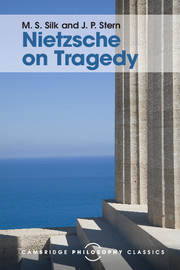Book contents
- Frontmatter
- Dedication
- Epigraph
- Contents
- Preface to this edition
- Preface
- Note
- 1 Germany and Greece
- 2 Biographical background I: Nietzsche and his early interests
- 3 Biographical background II: the genesis of The Birth of Tragedy
- 4 The argument of The Birth of Tragedy
- 5 The aftermath
- 6 Nietzsche's account of Greece
- 7 Mode and originality
- 8 Tragedy, music and aesthetics
- 9 Nietzsche and earlier German theories of tragedy
- 10 Style and philosophy
- Bibliography
- Index
Preface
Published online by Cambridge University Press: 05 August 2016
- Frontmatter
- Dedication
- Epigraph
- Contents
- Preface to this edition
- Preface
- Note
- 1 Germany and Greece
- 2 Biographical background I: Nietzsche and his early interests
- 3 Biographical background II: the genesis of The Birth of Tragedy
- 4 The argument of The Birth of Tragedy
- 5 The aftermath
- 6 Nietzsche's account of Greece
- 7 Mode and originality
- 8 Tragedy, music and aesthetics
- 9 Nietzsche and earlier German theories of tragedy
- 10 Style and philosophy
- Bibliography
- Index
Summary
Nietzsche on Tragedy is a study of Nietzsche's first book, The Birth of Tragedy. It is not a commentary on his philosophy as a whole, although it does take account of his other writings – letters and notes as well as books – where these have a bearing on the discussion. For anyone concerned with an understanding of the ancient world or the history of modern culture or ideas, with Nietzsche and the evolution of his philosophical idiom, with Wagner or with drama, especially Greek drama, The Birth of Tragedy is an important book. But although it is widely read and although it has been extremely influential, it has never been discussed as a whole (or, in some aspects, discussed at all), and it has been much misunderstood. The chief cause of both misunderstanding and partial treatment is the particular way that the book combines the perspectives of German thought with the knowledge of a Greek scholar. Being concerned with these two spheres in their daily work, and having a common interest in Nietzsche's book, the authors felt that together they might contribute in a concerted way to its appreciation. Their collaboration, under the circumstances, was bound to be a close one; in the event, it has been unusually close. In the first instance the Greek and the biographical material was worked by M. S. S., the material pertaining to German literature and thought by J. P. S. But each stage of the writing was preceded by so much discussion and followed by so much intensive rewriting on both sides, that the final version cannot be regarded as anything other than the joint effort of the two authors, who accept equal responsibility for it. When they first mooted the idea of a collaboration (at the institution to which this book is dedicated), the authors did not, as a matter of fact, share a common view of their subject. The final version is the product of mutual correction and convergence.
The authors wish to thank all those who assisted them during several years’ work on this book, among them Professor Mazzino Montinari, who generously provided material and advice concerning the unpublished portions of Nietzsche's Nachlass in Weimar, and Michael Tanner, who read the proofs.
- Type
- Chapter
- Information
- Nietzsche on Tragedy , pp. xi - xiiPublisher: Cambridge University PressPrint publication year: 2016



